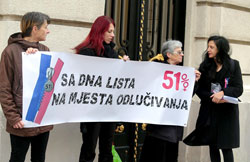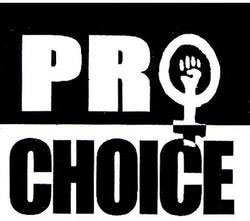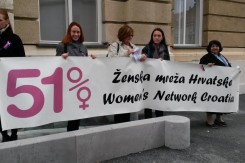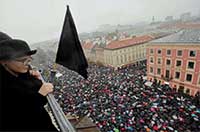On May 17, lesbian, gay, bisexual and transgender groups in more than 50 countries will commemorate the International Day Against Homophobia, an initiative launched in 2005 that commemorates the day in 1990 when the World Health Organization removed homosexuality from its roster of disorders. At the same time, Human Rights Watch also pointed to four areas where advances in human rights for lesbian, gay, bisexual and transgender people have given reason for hope.
“This ‘hall of shame’ does not claim to include the worst offenders, but it highlights leaders who have lent their authority to denying basic human rights,” said Scott Long, director of the Lesbian, Gay, Bisexual and Transgender Rights Program at Human Rights Watch.
“Bush and Pope Benedict both speak of human dignity, but their homophobic words and actions undermine families and endanger health.” Leaders named to the “Hall of Shame” for their actions in the past year are: Pope Benedict XVI: for undermining families. The leader of the Holy See has gone well beyond expressing the Church’s theological views on homosexuality. The Pope has intervened in politics in many other countries to condemn and threaten figures who support equal rights or any form of recognition for lesbian and gay families. After Spain legalized same-sex marriage in 2005, Pope Benedict’s Pontifical Council on the Family commanded Spanish officials to refuse to marry same-sex couples or even to process the paperwork if they tried to adopt a child.
US President George W. Bush: for jeopardizing public health. The President’s Emergency Plan for AIDS Relief (PEPFAR) requires that one-third of HIV-prevention spending go to so-called “abstinence-until-marriage” programs. These programs threaten the health of LGBT people by sending a message that there is no safe way for them to have sex, and by denying them life-saving information. In some countries, such as Uganda, grants from the $15 billion PEPFAR program have funded groups that actively promote homophobia; in others, they have drastically reduced condom provision.
Iranian President Mahmoud Ahmadinejad: for creating public and private scandals. President Ahmadinejad has overseen a widening campaign to “counter public immorality,” arbitrarily arresting thousands of Iranians for dressing or behaving differently. In recent weeks, for example, thousands of women have been detained for not conforming to “correct” Islamic dress. In Iran’s surveillance society, Ahmadinejad also uses religious vigilantes to raid homes and other private places in search of “deviant” behavior – including homosexual conduct. The Iranian regime polices public behavior and violates the right to privacy on a massive scale.
Roman Giertych, Polish Minister of Education and Deputy Prime Minister: for endangering children. Part of a right-wing government that has made homophobia a centerpiece of policy, Giertych’s education ministry has proposed a law to fine or imprison teachers, school officials, or student human rights defenders who even mention homosexuality. Vital facts about safer sex and protection against HIV/AIDS could be banned from schools under the new law.
Bienvenido Abante, Member of the Philippine House of Representatives and Chair of the House Committee on Civil, Political and Human Rights: for trying to force his sexual orientation on others. Representative Abante has urged that homosexuals be “cured” and turned into heterosexuals. He has repeatedly blocked a landmark bill that would ban discrimination based on sexual orientation and gender identity in the Philippines. He has also suggested that lesbian, gay, bisexual and transgender people are excluded from the “definition” of human rights. “Homophobia endangers basic human rights, and we should all be concerned by it,” said Long. “Governments devalue families when they deny any family recognition. They endanger children when they silence any child.”
Human Rights Watch also pointed to large and small gains that give reason for hope:
In Nepal, after years of abuse directed at lesbians, gays, and transgender people during a violent civil war, the authorities in February gave a meti (transgender person) in February an official citizenship ID with a gender listed as neither male nor female. This was first time that a government in South Asia has given transgender identity full state recognition.
In Denmark, Parliament in June extended equal access to reproductive technologies to lesbians and single women. Denmark in 1989 became the first country in the world to create civil unions for same-sex partners, but such unions have still discriminated against same-sex couples in many areas, including reproduction. The Danish decision marked a recognition of women’s equal worth as parents, and a further step toward full equality.
In Mexico, Mexico City and the northeastern state of Coahuila passed civil-union laws opening recognition to same-sex couples. Unions solemnized in Coahuila must be recognized as valid across Mexico. These moves come after the 2003 passage of a sweeping federal antidiscrimination law offering protection against unequal treatment based on sexual orientation.
Internationally, the Yogyakarta Principles on the Application of International Law in Relation to Issues of Sexual Orientation and Gender Identity were launched during the March session of the United Nations Human Rights Council. Adopted in November at a meeting of international legal experts in the Indonesian city of Yogyakarta, these groundbreaking principles spell out the international legal standards under which governments and other actors should end violence, abuse and discrimination against lesbian, gay, bisexual and transgender people, and ensure full equality.
To view the annual “Hall of Shame” that Human Rights Watch publishes of world leaders actively promoting prejudice against lesbian, gay, bisexual and transgender (LGBT) people, please visit
POVODOM MEĐUNARODNOG DANA BORBE PROTIV HOMOFOBIJE
PAPA NA “LISTI SRAMA”
Prošlog tjedna, točnije 16. svibnja, obilježen je Međunarodni dan borbe protiv homofobije, a tom se prilikom u “dobrom” društvu s američkim predsjednikom Georgeom W. Bushom i njegovim iranskim kolegom Mahmudom Ahmadinedžadom našao i papa Benedikt XVI.
Organizacija Human Rights Watch svu je trojicu svrstala u “hall of shame”, skupinu javnih osoba koje, kako tvrdi HRW, “ne spadaju među najgore prekršitelje, ali su zato svjetski vođe koji su svoj autoritet stavili u službu odricanja temeljnih ljudskih prava” homoseksualnim, biseksualnim i transrodnim osobama.
Međunarodni dan protiv homofobije obilježava se tek treću godinu, a na taj je datum 1990. godine Svjetska zdravstvena organizacija homoseksualnost službeno uklonila sa svoje liste bolesti, odnosno poremećaja. Papa se tako na “listi srama” našao zato jer je “otišao mnogo dalje od uobičajenog izražavanja katoličkih stavova o homoseksualnosti” tako što je direktno “politički intervenirao u mnogim zemljama osudama i prijetnjama javnim osobama koje podržavaju jednaka prava ili bilo koji oblik ozakonjivanja lezbijskih i homoseksualnih obitelji”.
Američki predsjednik Bush kritike je dobio zbog međunarodnog plana za pomoć oboljelima od AIDS-a (PEPFAR), čija je čak jedna trećina namijenjena programima “apstinencije prije braka”, čime se svim ugroženim osobama, a naročito seksualnim manjinama, “uskraćuju informacije koje bi im mogle spasiti život”, a često ne samo informacije, nego, primjerice, i dostupnost kondoma u siromašnim zemljama.
Iranski predsjednik Ahmadinedžad kritiziran je zbog svoje kampanje “protiv javnog nemorala”, u sklopu koje su tisuće žena uhapšene zbog “nekorektnog” odijevanja, a domovi osoba s “devijantnim” ponašanjem česte su mete racija.
Notorni poljski ministar obrazovanja i zamjenik premijera Roman Giertych prozvan je zbog ugrožavanja djece jer je predložio da se svi učitelji, školski službenici i studentski aktivisti koji se drznu spomenuti homoseksualnost kazne globom ili zatvorom, čime će se onemogućiti podučavanje djece o sigurnom seksu.
Filipinski političar Bienvenido Abante pozvao je, pak, na “izlječenje” homoseksualaca i predložio da se seksualne manjine isključe iz “definicije” ljudskih prava.
Da sve nije tako crno, potvrđuju, pak, primjeri Nepala, Danske i Meksika, država koje su donijele zakonske mjere bitne za izjednačavanje prava homoseksualnih osoba s ostalima, kao i prije nekoliko mjeseci doneseni takozvani Yogakarta principi o međunarodnim zakonskim standardima za iskorjenjivanje nasilja i diskriminacije osoba različite rodne i seksualne orijentacije.





